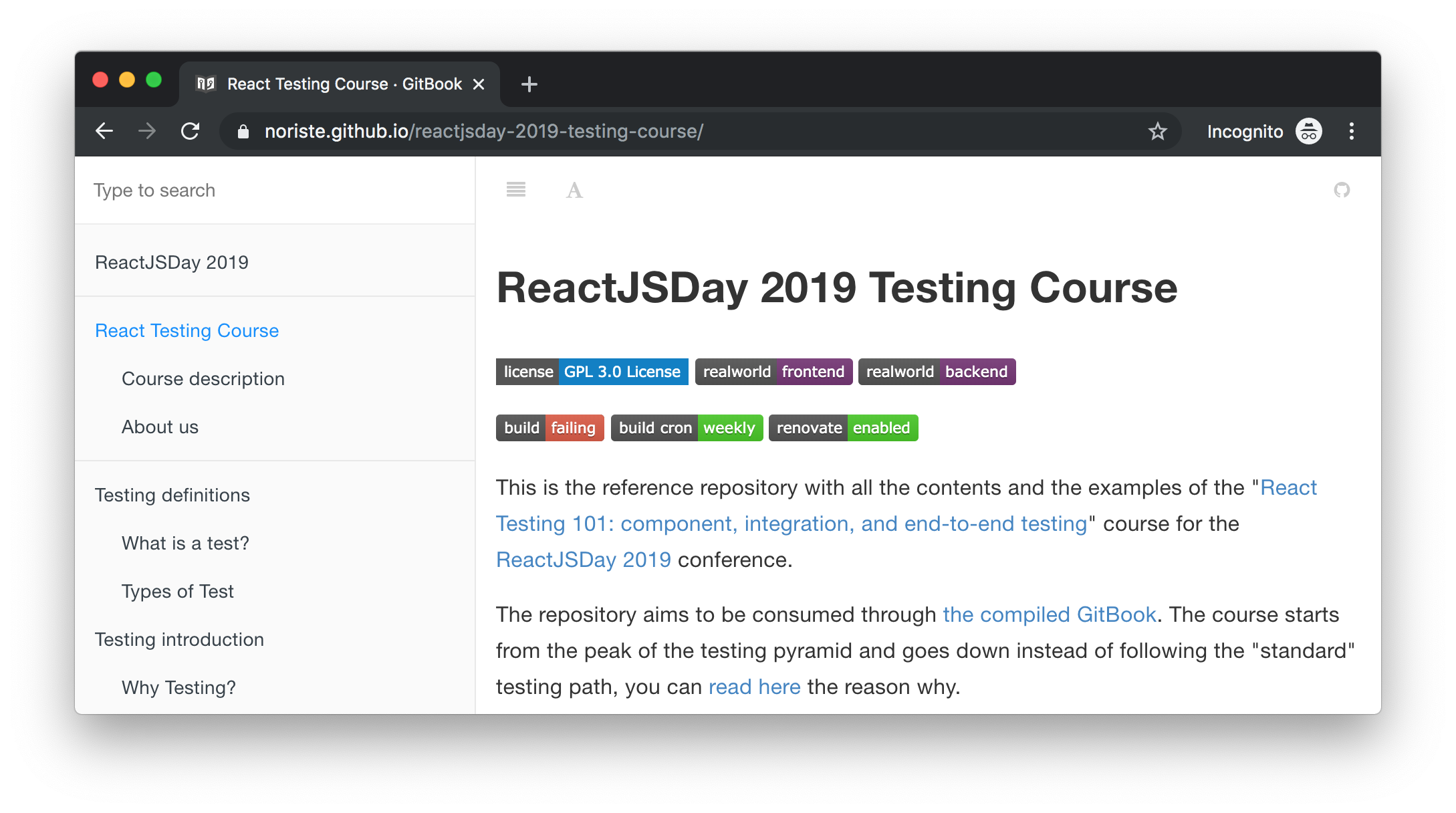ReactJSDay 2019 Testing Course
By Stefano Magni and Jaga Santagostino
About us


Stefano Magni
Senior front-end developer
Jaga Santagostino
Fullstack JavaScript developer
About the GitBook
All the contents and the code of the course are available at

What is a test?
A test is code that throws an error when the actual result of something does not match the expected output.
const sum = (a, b) => a + b;
const subtract = (a, b) => a - b;
let result, expected;
result = sum(3, 7);
expected = 10;
if (result !== expected) {
throw new Error(`${result} is not equal to ${expected}`);
}
result = subtract(7, 3);
expected = 4;
if (result !== expected) {
throw new Error(`${result} is not equal to ${expected}`);
}
A first test with Jest
The previous "tests" rewritten for Jest (and the Jest output,when launched in the terminal).
const sum = (a, b) => a + b;
const subtract = (a, b) => a - b;
test("Should sum", () => {
expect(sum(3, 7)).toEqual(10);
});
test("Should subtract", () => {
expect(subtract(7, 3)).toEqual(4);
});PASS tests/test-introdution/base.test.js
✓ Should sum (1ms)
✓ Should subtract
Test Suites: 1 passed, 1 total
Tests: 2 passed, 2 total
Snapshots: 0 total
Time: 0.08s, estimated 1scontext / describe
They allow organizing tests.
const sum = (a, b) => a + b;
const subtract = (a, b) => a - b;
describe("Math operations", () => {
test("Should sum", () => {
expect(sum(3, 7)).toEqual(10);
});
test("Should subtract", () => {
expect(subtract(7, 3)).toEqual(4);
});
}); PASS tests/test-introdution/describe.test.js
Math operations
✓ Should sum (1ms)
✓ Should subtract
Test Suites: 1 passed, 1 total
Tests: 2 passed, 2 total
Snapshots: 0 total
Time: 0.072s, estimated 1sonly / skip
They allow isolating the tests.
const sum = (a, b) => a + b;
const subtract = (a, b) => a - b;
describe("Math operations", () => {
test.only("Should sum", () => {
expect(sum(3, 7)).toEqual(10);
});
test("Should subtract", () => {
expect(subtract(7, 3)).toEqual(4);
});
});PASS tests/test-introdution/only.test.js
Math operations
✓ Should sum (2ms)
○ skipped Should subtract
Test Suites: 1 passed, 1 total
Tests: 1 skipped, 1 passed, 2 total
Snapshots: 0 total
Time: 0.066s, estimated 1sconst sum = (a, b) => a + b;
const subtract = (a, b) => a - b;
describe("Math operations", () => {
test.skip("Should sum", () => {
expect(sum(3, 7)).toEqual(10);
});
test("Should subtract", () => {
expect(subtract(7, 3)).toEqual(4);
});
});PASS tests/test-introdution/skip.test.js
Math operations
✓ Should subtract (1ms)
○ skipped Should sum
Test Suites: 1 passed, 1 total
Tests: 1 skipped, 1 passed, 2 total
Snapshots: 0 total
Time: 0.066s, estimated 1sbefore / beforeEach / after / afterEach
They allow running common code before/after the tests.
const sum = (a, b) => a + b;
const subtract = (a, b) => a - b;
describe("Math operations", () => {
let i = 0;
afterEach(() => {
i++;
console.log(`${i} tests run`);
});
test("Should sum", () => {
expect(sum(3, 7)).toEqual(10);
});
test("Should subtract", () => {
expect(subtract(7, 3)).toEqual(4);
});
});PASS tests/test-introdution/after-each.test.js
Math operations
✓ Should sum (1ms)
✓ Should subtract (1ms)
console.log tests/test-introdution/after-each.test.js:8
1 tests run
console.log tests/test-introdution/after-each.test.js:8
2 tests run
Test Suites: 1 passed, 1 total
Tests: 2 passed, 2 total
Snapshots: 0 total
Time: 0.311s, estimated 1sWhy testing?
-
to control that the code does what we expect
-
to avoid direct and indirect regressions
-
to reproduce corner cases
-
to leverage the speed of an automated tool
-
to leverage forever the automatic checks
Why testing?
-
to tell a story about the code
-
to prevent problems instead of facing them
-
to kill refactoring fear
-
to get us working with a lower cognitive load
Some testing rules
• we must write the test as soon as we write the code
• false-negative tests are evil
• the tests must be simple to be read
• avoid DRYing the test code too early
• avoid conditional tests
• care about the test feedback in case of failures
Some testing rules
• the tests must be deterministic and independent
• sleep(1000) is evil too
• the test must fail before you write the code and succeed when you have written the code
• the tests must be fast, as fast as possible
• never do white-box testing
Some testing rules
• code coverage helps us find what we have not tested yet, it is not an end in itself
• if you're not enough confident about your application, think twice about your tests
• you should not test external services, third-party libraries, and native APIs
• last but not least: remember that testing and TDD are two different things
Testing fun
• tests allow you to study
• testing throw responsibility away (in good meaning) because you are no more an elephant in a glass shop. Instead, while touching some code, you are part of a protected-by-tests sandbox, coding becomes easier
Types of test
⚛️
⚛️ ⚛️ ⚛️
⚛️ ⚛️ ⚛️
Unit testing:
> function() {}
Integration testing:
> function() {
function() {}
function() {}
function() {}
}
React unit/component testing:
>
React Integration testing:
>
With Jest
With Jest + React Testing Library
Types of test
UI Integration testing:
With Cypress (Chrome) + Cypress Testing Library
⚛️ ⚛️ ⚛️
⚛️ ⚛️ ⚛️
E2E testing:
⚛️ ⚛️ ⚛️
⚛️ ⚛️ ⚛️
Standard approach
Unit tests
Integration tests
UI tests
This course approach
Unit tests
Integration tests
UI tests





